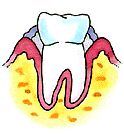| Conditions that may Cause Gum Disease |

Other Causes of Gum Disease
While bacterial plaque is the primary cause of periodontal disease, several other secondary causes can contribute in developing periodontal diseases. It is not clear if the following conditions are actual causes of gum disease, but they are believed to increase the risk, severity, and speed of gum disease development.
Conditions that may cause Gum Disease
Besides dental plaque, other conditions that may cause gum disease problems include:
Medications
Usage of several types of medications is included among the causes of periodontal diseases. Medications such as blood pressure medicines, steroids, some types of anti-seizure drugs, cancer treatment drugs, some hypertension medicines and oral contraceptives can all affect the gums, making them more susceptible to gum disease.
Some of the drugs, such as antidepressants and some heart medicines, reduce the flow of saliva which is known to have a protective effect for teeth and gum tissue lowering the mouth’s defence to infections. Others cause an overgrowth of gum tissue, so that removing plaque becomes more difficult, promoting the development of gingivitis. Always inform your dentist about any medications you take, so that he can advice you on additional gum disease preventive measures, if needed.
Medical conditions
- Diabetes is a disease that causes fluctuations at the levels of sugar in the blood. Patients are at higher risk for developing infections such as periodontal diseases, because of diabetes impairing the function of certain immune cells and decreasing the production of collagen and bone. Patients with uncontrolled diabetes are not only at higher risk of gum disease, but they may also experience more severe gum infections, difficult healing and a greater loss of bone and connective tissues. Diabetes is the #1 systemic condition increasing susceptibility to periodontal disease.
- Systemic diseases that affect the body’s immune response such as cancer, leukemia or HIV make people more susceptible to periodontal disease.
- Autoimmune conditions (Crohn's disease, multiple sclerosis, rheumatoid arthritis, lupus erythematosus, CREST syndrome) have also been associated with a higher incidence of periodontal disease.
- Osteoporosis - The loss of minerals from bones’ structures, caused by osteoporosis, may make bones supporting the teeth more vulnerable to bacterial infection, increasing the risk of gum disease and tooth loss.
- Vitamin deficiencies - Vitamin C has antioxidant effects that help minimize the damage caused by tissue-destroying oxidants in periodontal disease. It also contributes in the mechanisms used by the human body to repair connective tissues.Vitamin C deficiency (scurvy) can cause inflamed, bleeding gums. Niacin deficiency (pellagra) also leads to inflamed, bleeding gums and a predisposition to certain mouth infections, such as periodontal diseases, oral thrush, or glossitis. Vitamin C and niacin supplements, and a diet rich in fresh fruits and vegetables can help prevent gum disease.
- Viral infections can cause gingivitis. Acute herpetic gingivostomatitis is a painful viral infection of the gums and other parts of the mouth caused by the herpes virus.
- Fungal infections can cause gingivitis as well. Oral thrush (candidiasis) is a fungal infection in which the overgrowth of fungi, particularly Candida albicans, forms a white film that irritates the gums.
Smoking/Tobacco Use
Smoking is considered as one of the most significant behavioral factors in the development and progression of periodontal disease. Smokers show 2-7 times higher possibility to develop periodontitis than non smokers.
Smoking reduces the effectiveness of the immune system, suppressing the production of antibodies directed against some of the harmful bacteria, allowing them to grow uncontrolled and cause gum disease. Smoking has been found to promote inflammation and bone loss. Quitting smoking must be a part of any prevention or treatment plan for periodontal disease.
Impacted Wisdom Teeth (Pericoronitis)
Wisdom teeth that have failed to erupt or have only partially erupted from gums are usually responsible for the inflammation and infection of the gums surrounding the crown of the impacted tooth. This type of localized periodontal disease, called pericoronitis, is commonly resolved with the extraction of the wisdom tooth.
Human Transmission
Harmful bacteria that cause gum disease can be transmitted from one person to another. If a family member has periodontal disease, the risk is increased for the rest of the family members. Avoid kissing a person you know having gum disease, and never share your toothbrush.
Several other factors increase the risk for periodontal disease, by either contributing to the formation of bacterial plaque or/and by reducing the body’s ability to respond to bacterial infections.
- Dental Plaque
- Dental Calculus
- Gum Disease
- Tooth Decay
- Tooth Abscess
- Toothache
- Tooth Loss
Related Problems
- Gum Disease Treatments
- Gingivitis
Treatment - Periodontitis Treatment
- Dental Scaling & Root Planing
- Antibiotics for
Gum Disease - Gum Surgery
- Gingivectomy
- Gum Flap Surgery -
Pocket Reduction - Periodontal
Bone Grafts - Gum Grafts -
Soft Tissue Graft - Crown
Lengthening - Dental Implants
articles about
Gum Disease Treatment
